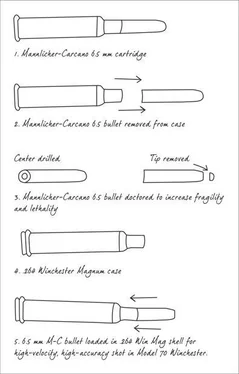Stephen Hunter - The Third Bullet
Здесь есть возможность читать онлайн «Stephen Hunter - The Third Bullet» весь текст электронной книги совершенно бесплатно (целиком полную версию без сокращений). В некоторых случаях можно слушать аудио, скачать через торрент в формате fb2 и присутствует краткое содержание. Жанр: Триллер, на английском языке. Описание произведения, (предисловие) а так же отзывы посетителей доступны на портале библиотеки ЛибКат.
- Название:The Third Bullet
- Автор:
- Жанр:
- Год:неизвестен
- ISBN:нет данных
- Рейтинг книги:5 / 5. Голосов: 1
-
Избранное:Добавить в избранное
- Отзывы:
-
Ваша оценка:
- 100
- 1
- 2
- 3
- 4
- 5
The Third Bullet: краткое содержание, описание и аннотация
Предлагаем к чтению аннотацию, описание, краткое содержание или предисловие (зависит от того, что написал сам автор книги «The Third Bullet»). Если вы не нашли необходимую информацию о книге — напишите в комментариях, мы постараемся отыскать её.
The Third Bullet — читать онлайн бесплатно полную книгу (весь текст) целиком
Ниже представлен текст книги, разбитый по страницам. Система сохранения места последней прочитанной страницы, позволяет с удобством читать онлайн бесплатно книгу «The Third Bullet», без необходимости каждый раз заново искать на чём Вы остановились. Поставьте закладку, и сможете в любой момент перейти на страницу, на которой закончили чтение.
Интервал:
Закладка:
I continued down Houston until I reached Commerce and started up it. The Adolphus was ten or so blocks away. Then, miraculously, I was able to flag a cab. I gave him the hotel and got Lon in. The driver couldn’t stop jabbering.
“Did you see it?”
“No,” I said, which should have been sufficient, but like any guilty man, I overexplained. “We were at the doctor’s for my brother’s checkup.”
He didn’t notice. His mind was obsessed with what had happened ten minutes ago. “Man, I can’t believe it. Can you, mister? Holy cow, it’s such a tragedy. He was such a handsome young man. And that wife. God, what a dish. She was Jean Simmons and Dana Wynter combined with a little Audrey Hepburn. Oh, Lord, what she must be going through. I heard on the cop channel, they drilled him square in the head and there wasn’t anything left and–”
“Is it official? Is he dead?”
“I don’t know. God, what a mess.”
It took some time to fight our way up Commerce – it was as if the city had shut down everywhere except Dealey Plaza – but eventually, we arrived at the Adolphus. The doorman, solemn as was everybody, helped me get Lon out of the cab seat and into his chair. I could see he had been crying.
The crying continued inside, where a few old ladies of the flowery Southern-gentlewoman sort sat in a corner of the lobby, two of them in tears, the other two ministering to them with white hankies. I heard someone ask if the show at the Century Room would be canceled that night.
“I need a drink,” said Lon.
“Good idea,” I said.
I wheeled us through the lobby, past the Grand Staircase and the elevators, and into the dark Men’s Bar, surprisingly crowded, surprisingly quiet, dominated by a large black-and-white TV above the mirror at the center. We found a table with a good view of it, requested that the waiter turn it up, and went through the Texan idiocy of the bottle club.
“Jenkins,” I said, giving my official cover name, under which I was registered. “I have a bottle of bourbon, J.B.; could I have a shot straight and a glass of ice water?”
Lon remembered his own nom de guerre, laid claim to his bottle of Southern Comfort, and ordered his own straight shot, with ice on the side.
“Bring both bottles, sirs?” the waiter asked.
“Yes,” I said, “I think we’re going to need them.”
I checked my watch. By now it was 1:39. Evidently, Walter Cronkite had just announced, then taken off his glasses and pinched his nose, that JFK was gone. Someone said something wise, and someone else closed him down fast Texas-style with “Shut up, Charlie Tait, or dadgum, I will shut you up myself.”
We sat there all afternoon in the dark silence, watching the images float across the screen. We watched the discovery of Alek’s rifle and the three cartridge cases, we heard of the swearing in of Lyndon Johnson, all without comment. The news came shortly thereafter that a cop had been shot to death in the Oak Cliff section of Dallas, but nobody knew whether it was related to the president’s death except me. Alek’s roominghouse was in Oak Cliff; it had to be him, and the description of the assailant – young white man, five-ten or so, muscular build, under thirty – had to be him. At the time, I thought, Damn, I told him not to bring a gun, and the bastard disobeyed me! I knew I never should have counted on him and cursed myself doubly for springing such a dangerous incompetent on the snoozing world. Later, I realized he’d gone all the way back across town to retrieve the pistol, so he had at least stayed under discipline until he understood that he’d been betrayed. That was all I could have asked of him.
I said a prayer for the policeman. Hypocritical, no? But hypocrisy is one sin I cannot evade; it is, after all, the core of my profession, a demure churchgoing dad and Yalie by weekend who plots murder by weekday. I was quick to come to terms with it. I concluded in the end that I had done all that was possible to ensure such an outcome would not happen. It did anyway because of the intractability of the piteous Alek. It is a misfortune but not a tragedy. All operations of force – we were to learn this in spades in the coming decade – involve risk of collateral damage. The policeman, like the president, made his career decision based on a cost-benefit analysis, took his chances, and his number came up. That is the wicked way of the real world, morally justifiable if the ends themselves are morally justifiable. So it goes.
“I don’t think I can take any more of this,” Lon finally said.
“You okay?” I said.
“I’ve felt better,” he replied.
“Remember,” I said. “The long view.”
“Easy to say,” he said. “Not so easy to do.”
“I’ll push you,” I said, and started to get up.
“Hugh, I’ve had enough of you for one day, all right?”
He wheeled himself out of the bar, and I watched him propel himself across the lobby to the elevator, where another guest had to punch his floor. He rolled into the car, the brass doors closed behind him, and off he went.
I went back to the bourbon and the television. I watched Air Force One take off with the new president, the body of the old president, and that poor crushed rose of a woman who was, just two hours ago, the glamour center of the world.
At about 3:20, it came. It signified the beginning of a new phase, one in which I was extremely vulnerable, as was the agency for which I worked (and which I loved), whose reputation and possible ruin I had risked.
This from Dallas. The police department arrested a twenty-four-year-old man, Lee H. Oswald, in connection with the slaying of a Dallas policeman shortly after President Kennedy was assassinated. He also is being questioned to see if he had any connection with the slaying of the president. Oswald was pulled yelling and screaming from the Texas Theatre in the Oak Cliff section of Dallas. .
It didn’t take long for them to round him up, did it? About two hours, and in that time he’d managed to kill a policeman. What a complete fool he was. Again it made me sick, and I took another bolt of the hooch, which hit like a mallet, driving me further into blur. I think I phased out after that, as the bourbon took over, and I fell into a stupor. I was not behaving well. This was not in the “Pip-pip, onward and upward” tradition of the agency and all its Skull and Bonesers. The event had reduced me to alcoholic stupor.
I don’t remember going upstairs to my room or taking a shower. Or climbing into my pajamas. I don’t remember going facedown on the bed.
I do remember waking up around midnight. And I remember the panic I felt.
Where was Jimmy Costello?
CHAPTER 18
These strange ‘visions,’ for such they must be called, are extremely vivid in some cases but are almost incredible to the vast majority of mankind, who would set them down as fantastic nonsense. Nevertheless they are familiar parts of the mental furniture of the rest, whose imaginations they have unconsciously framed and where they remain, unmodified or unmodifiable, by teaching.”
Bob squinted, feeling his brow crunch in pain. So wrote Francis Galton in the late nineteenth century, and Bob thought: What the fuck?
If he understood it, and he wasn’t sure he did, Niles Gardner had been fascinated by whatever thing it was that Sir Francis had noted 120 or so years earlier, some “fantastic vision” disease or condition. It had to do with colors showing up when cued by encounters with nothing of color. A letter could have a color to it or, in this case, a number.
He seemed to be saying or acknowledging or somehow having fun with – there was an unidentifiable sense of lightness to it, humor, almost a joke – how he saw certain things in color. He would always see the number four as blue, which was why he had four junky ceramic bluebirds on his shelf, and the number six as green, which was why he had a magazine illustration from the fifties that incidentally displayed six green elm trees. Most provocatively, he saw the number nine as red, which was why he had a Mauser 96 pistol lying around, one of the few Mausers designated by the numeral 9 engraved in the grip, then painted red, and known forever after as Red Nines.
Читать дальшеИнтервал:
Закладка:
Похожие книги на «The Third Bullet»
Представляем Вашему вниманию похожие книги на «The Third Bullet» списком для выбора. Мы отобрали схожую по названию и смыслу литературу в надежде предоставить читателям больше вариантов отыскать новые, интересные, ещё непрочитанные произведения.
Обсуждение, отзывы о книге «The Third Bullet» и просто собственные мнения читателей. Оставьте ваши комментарии, напишите, что Вы думаете о произведении, его смысле или главных героях. Укажите что конкретно понравилось, а что нет, и почему Вы так считаете.












